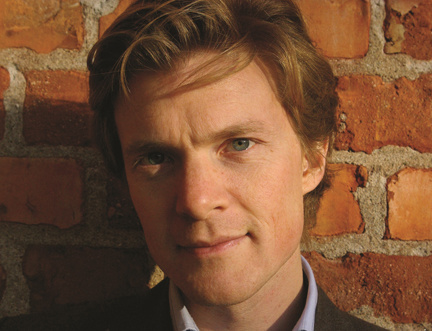More articles Saturday 12 August 2017 2:30pm
Social Media Causing Global Anxiety Claims Johan Norberg

Overwhelming social media is contributing to a “sense of pessimism and horror” that risks undermining genuine global progress, according to the Swedish historian Johan Norberg, speaking at the Book Festival this morning.
Online platforms like Twitter and Facebook, claimed the author and commentator, gave users a “constant chaotic anxiety about the world” for which they were not prepared.
Appearing on the first day of the Book Festival, Norberg spoke about his recent book Progress: Ten Reasons to Look Forward to the Future, and his belief that in spite of recent events the case for “global optimism” was stronger than most people believe.
Asked about social media, he expressed concerns that the “global media” fuelled a “new anxiety”. “Human horrors,” said Norberg, were not new, but the cellphone camera was, “so there will always be someone who’ll give us live pictures from everything going horribly wrong, or any human horror around the world.”
While that was important, he added, there was a “risk” people would “only see those horrors” and therefore believe they had “become worse than ever before”. “But social media also does this in a chaotic way,” said Norberg, and “that gives us a sort of constant chronic anxiety about the world.”
Previously, people would “tune in to the evening news” to find out what was happening in the world, and were therefore “sort of prepared” for their “daily doses of crime, famine and war” before getting on with their lives.
“Today with social media”, said Norberg, “everything attacks us from every angle without really being organized in any way. So, when I look at my Facebook flow, or Twitter flow, it’s ‘oh, some friends have a great vacation, wonderful’, and then it’s children being killed in Aleppo…so we’re totally unprepared and it comes at us from every angle, and it gives us this sense there’s no stopping it.”
Norberg said he had started organizing his “social media flows” so that his Instagram feed, for example, only featured “friends showing pictures from their vacations” because he was “not prepared for anything else” and did not want to be “drowning in the horrors”.
“I think we have to start learning how to do that when it comes to other social media as well. I think this contributes to this sense of pessimism and horror and there’s no stopping it.”
Norberg’s sold out event, On the Brighter Side of Life, formed part of the Book Festival’s Age of Political Earthquakes series of events.
The author, who is associated with the Cato Institute in Washington DC, also spoke about the “challenge” facing the “free press around the world”. “If we can’t all agree that we need a sometimes-chaotic media,” he said, “then that’s really scary.” Norberg said it was already happening in European Union countries like Poland and Hungary, and that it was likely to be “a major fight in the future”.
Described as a “new optimist”, Norberg was originally a left-wing anarchist. “I didn’t believe in progress,” he told fellow author Julia Hobsbawm, who was chairing the event, “that’s not where I started.”
But after studying historical data and context, Norberg came to view globalization as a force for good, with fewer people suffering from war and slavery than ever before, and the number of democracies on the rise. “Despite all the problems we have,” he said, “we solve more problems than we create, but the problem is nobody believes this…more people believe the moon landing was fake than believe in progress.”
“If we miss all the human progress that takes place when human beings are free to think of strange new ideas and exchange those ideas with others,” said Norberg, “if we don’t understand the progress that happens, it’s dangerous, because we will only have this sense the world is a dangerous, risky place.”
“And something happens to us when we think the world is collapsing. We get scared, we get anxious, and we begin to think that the world is a horrible place and that everyone else is horrible, and that strangers and foreigners are horrible, and that triggers something scary.”
- 2026 Festival:
- 15-30 August
Latest News
 Major new partnership with Celtic Connections
Major new partnership with Celtic Connections



